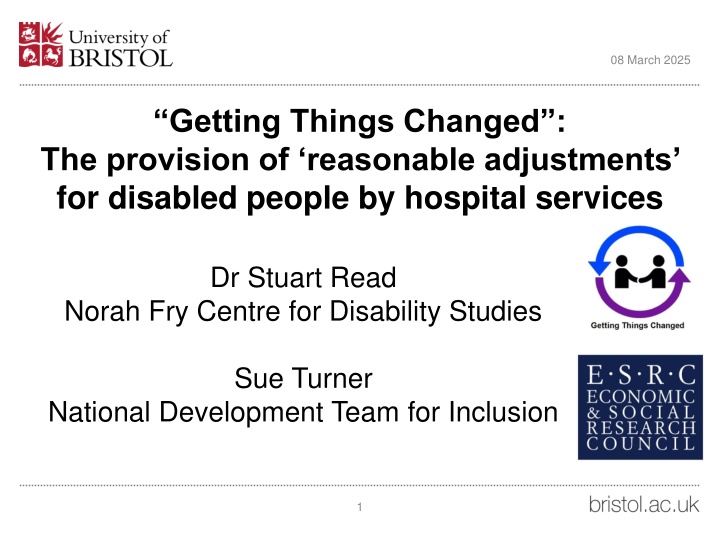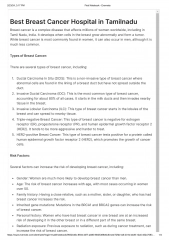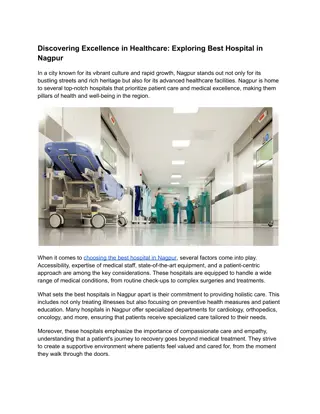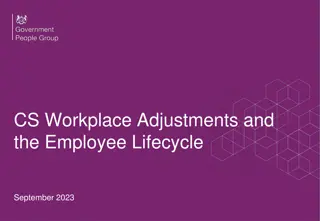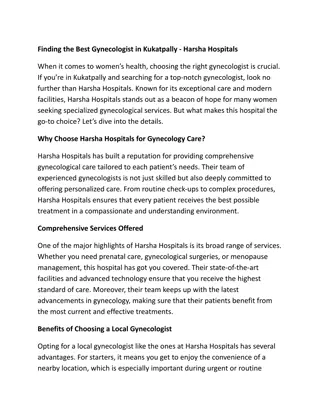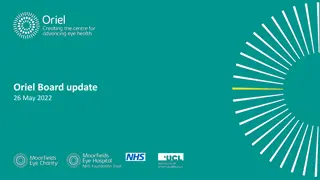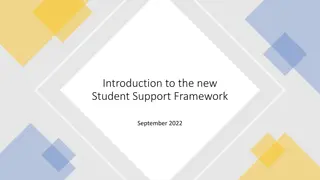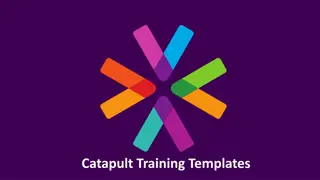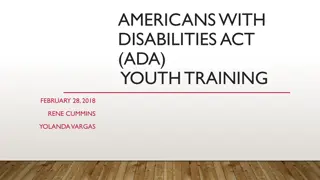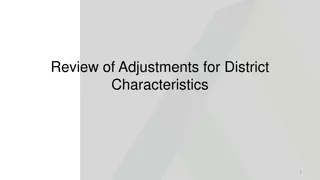Provision of Reasonable Adjustments in Hospitals
This content discusses the importance of providing reasonable adjustments for disabled individuals in hospital services. It covers the definition of reasonable adjustments, who can request them, and what factors determine the reasonableness of an adjustment. The program "Getting Things Changed" focuses on improving various aspects of support for disabled individuals.
Download Presentation

Please find below an Image/Link to download the presentation.
The content on the website is provided AS IS for your information and personal use only. It may not be sold, licensed, or shared on other websites without obtaining consent from the author.If you encounter any issues during the download, it is possible that the publisher has removed the file from their server.
You are allowed to download the files provided on this website for personal or commercial use, subject to the condition that they are used lawfully. All files are the property of their respective owners.
The content on the website is provided AS IS for your information and personal use only. It may not be sold, licensed, or shared on other websites without obtaining consent from the author.
E N D
Presentation Transcript
08 March 2025 Getting Things Changed : The provision of reasonable adjustments for disabled people by hospital services Dr Stuart Read Norah Fry Centre for Disability Studies Sue Turner National Development Team for Inclusion 1
Overview of keynote Introduction to Getting Things Changed programme What are reasonable adjustments, and what are the obligations of health care providers? Overview of our reasonable adjustments project, and some of our initial findings Ideas for how we can make changes to how reasonable adjustments are provided within health care services 2
Getting Things Changed programme Programme focuses on tackling five areas of disabling practice and making changes to improve the situation: 1. Conversations between disabled people and support staff. 2. Disabling practices for university students and staff. 3. Reasonable adjustments in hospitals. 4. Supporting parents with learning disabilities. 5. User-driven commissioning (with Disability Rights UK). Funded by the Economic and Social Research Council (ESRC) 2015-2018 3
What are reasonable adjustments? Reasonable adjustments are the changes that organisations need to make for disabled people, so that disabled people are not disadvantaged in receiving a service. Organisations have a legal responsibility under the Equality Act 2010 to anticipate and provide the changes or adjustments that disabled people might require. 4
Who can request reasonable adjustments? A person who is placed at a substantial disadvantage because of their disability compared to non-disabled people or people who don't share their disability. Substantial means more than minor or trivial. Disabled people should never be asked to pay for these changes. 5
What is a reasonable adjustment? Adjustments only have to be made if it s reasonable to do so. What's a reasonable thing to ask for depends on things like: A person s disability How practicable the changes are If the change requested would overcome the disadvantage any other disabled people experience The size of the organisation How much money and resources are available The cost of making the changes If any changes have already been made. 6
Examples of reasonable adjustments System-level adjustments e.g. disabled toilets, ramps, automatic doors, quiet spaces, easy read information, staff training about the needs of disabled people and equality issues. Individual-level adjustments e.g. changes to appointment lengths or times, enabling familiar supporters to remain with the person, provision of particular equipment, offering familiarisation visits. 7
What does the Equality Act require from hospitals? Changes to the way things are done - Changing ways of doing things that make it more difficult for disabled people to access or do something e.g. change to visiting policy, change to appointment list. Changes to a physical feature - Altering a physical feature of a building or other premises so that it is easier for a disabled person to access or use it e.g. disabled toilet, clear signage. Provision of extra aids or services - Provision of particular equipment or services to help a disabled person to access or do something e.g. BSL interpreters, extra staff assistance, home visiting. 8
Overview of reasonable adjustments project Our focus is to assess the provision of reasonable adjustments for disabled people in hospitals. What hospital services do well, and how they can improve their provision of reasonable adjustments. Thinking about bridging the gap (where necessary) between what should happen and what actually does happen. 9
Overview of reasonable adjustments project Audit of CQC inspection reports from 2015 and 2016. Freedom of information request regarding Monitor criteria (2015) for patients with learning disabilities. Survey for health professionals and Healthwatch. Interviews with disabled people. Workshops in March and April 2017 in Bristol and Leeds. 10
Initial findings Our workshops and interviews with disabled people highlighted examples of where hospitals are making provisions of reasonable adjustments. However, good practice appears patchy. Variable findings from CQC reports, freedom of information requests, survey data and disabled people s interviews. 11
Initial findings: Survey and FOI Survey provided many examples of how hospitals provide reasonable adjustments Reasonable adjustments are implemented for outpatient appointments such as reduced waiting times, first on list, etc. Flag on hospital system which notifies liaison team when a person with learning disabilities attends A&E, is admitted to hospital, or is added to a waiting list for surgery. 12
Initial findings: Survey and FOI However, the survey and FOI data also highlighted: Limited use of flagging (FOI) 40% of foundation trusts unable to provide complete information. Limited evidence of audit material (survey and FOI) 56% of survey respondents said their trust completed audits, however no participant provided information on how to locate this information. 49% of foundation trusts in FOI did not complete audits. 13
Initial findings: Interviews The only time I've ever been offered transport was on the last operation. When I got up the next morning, and they said, 'Yeah, you're fine, you've come round from anaesthetic alright. Go home.' I said, 'Well I've got to phone somebody to come and pick me up now, because I'm not allowed to travel on my own.' And they said, 'Oh, right, hold on, we'll get you a taxi.' And they actually got a taxi from (City) to bring me all the way home. So it was good, but it was sort of ill thought out. It could have been a lot easier. 14
08 March 2025 So how do we change things? 15
Change Management Theory Condensed! There are four essential pre-requisites to change, without which change will fail. Dissatisfaction with the present without which people will not want to change. A vision for the future because no matter how unhappy, people have to have an alternative vision to head towards. Skills and resources for change without which the vision cannot be delivered. Practical first steps because change can be daunting and without which people may never leave the starting blocks. 16
Potential strategies to adopt in implementing change Empirical-rational strategy Assumes that people are rational and will adopt change if it can be justified and is in their self-interest. Power-coercive strategy Top down and assumes that people obey instructions from higher authorities. Normative re-educative strategy Assumes that providing information and education will change people's usual behaviour patterns and help them develop new ones. 17
Example 1 Clear evidence of higher numbers of people with learning disabilities admitted to hospital with constipation as an emergency and shocking examples of people dying. This was a need locally that hadn t been addressed. Bringing a regional working group together with clear ideas about what needs to happen. Having the right information and the right people in the room to take actions. Agreeing first steps. https://www.ndti.org.uk/resources/publications/reasonable- adjustments-for-people-with-learning-disabilities-in-the- managem 18
Example 2 Health equity audit showed low numbers of women with learning disabilities attending breast screening Employment of cancer screening liaison nurses Partnership working across learning disability services, screening services and acute liaison nurse Getting national interest Monitoring progress and reporting back https://www.ndti.org.uk/resources/publications/screening- services-strategy-and-toolkit 19
Resources about Reasonable Adjustments Learning Disability Public Health Observatory Reasonable Adjustments Database accessed through the IHaL archive: https://tinyurl.com/improvinghealthandlivesarchive Reasonable adjustments digests and Working Together 2. Easy steps to improve support for people with learning disabilities in hospitals through archive and on: https://www.ndti.org.uk/our-work/our-projects/peoples- health/improving-health-and-lives-ihal 20
Summary Hospital staff are legally required to make reasonable adjustments for disabled people accessing care. Yet, our research highlights that current provisions of reasonable adjustments are patchy. As care providers, we need to be aware of how we make reasonable adjustments order to see how improvements can be made for disabled people. For change to be effective, its long term sustainability must be considered and addressed. 21
Considerations for your practice Our project argues that reasonable adjustment policy may not be enacted effectively within hospitals. Questions for you to consider: What reasonable adjustments does your hospital provide, and for whom (e.g. only for patients with learning disabilities?) Is the implementation of reasonable adjustments monitored and evaluated? Where do you think your hospital could improve its provisions of reasonable adjustments? What strategies could your hospital enact to make the implementation of reasonable adjustments common practice? 22
Our contact details Dr Stuart Read: Email: stuart.read@bristol.ac.uk Tel: 0117 331 0471 Sue Turner Email: sue.turner@ndti.org.uk Tel: 07837 935 500 Getting Things Changed Email: gtc-sps@bristol.ac.uk Website: http://www.bristol.ac.uk/sps/gettingthingschanged/ 23
